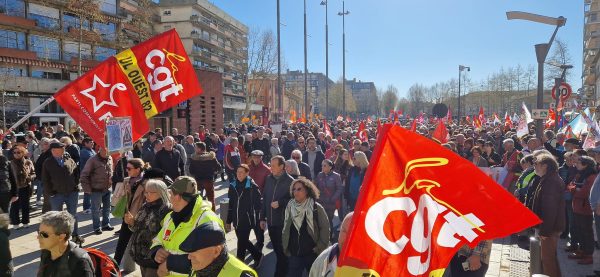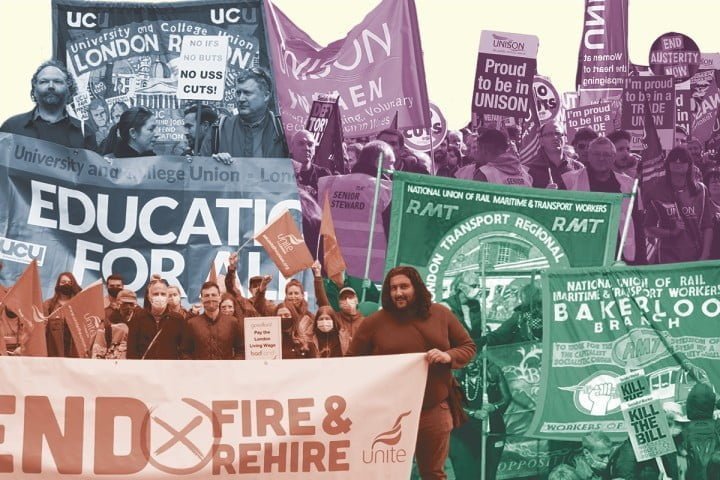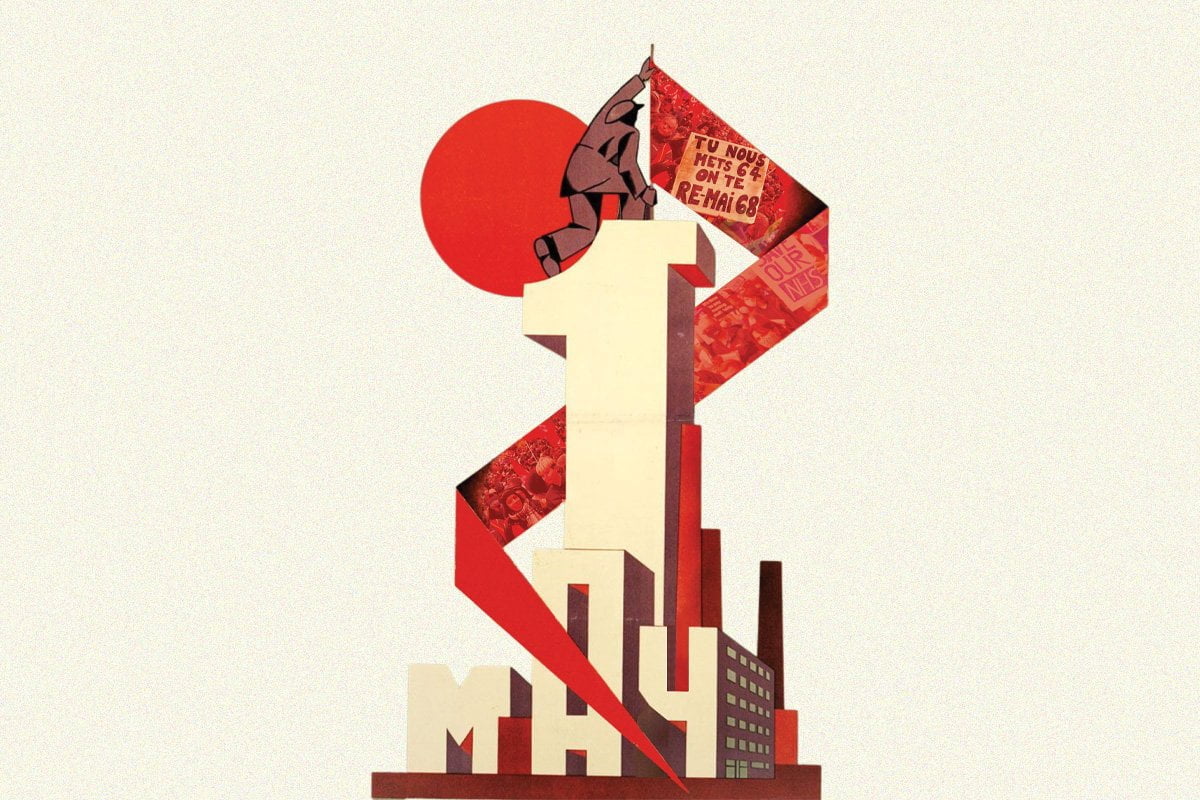This May Day, International Workers’ Day (IWD), will see millions of workers around the world coming out to demonstrate – not just as a celebration of the history of our class, but to demand a better future too.
For well over a hundred years, 1 May has been an important day in the calendar for the working class.
This tradition was born in Australia in the mid-19th century, as part of the struggle for the eight-hour day. It later became an international ‘day of action’ following the martyrdom of striking workers in Chicago in May 1886.
As Rosa Luxemburg put it, while this demand was eventually won, “as long as the struggle of the workers against the bourgeoisie and the ruling class continues, as long as all demands are not met, May Day will be the yearly expression of these demands.”
The backdrop to this year’s May Day marches proves this point. IWD comes amidst a strike wave that has broken out in recent months in Britain and across Europe, sparked by the cost-of-living crisis that is crushing living standards for workers in all countries.
France

From civil servants in Portugal; to transport workers in Germany, Belgium, and Sweden; to doctors and nurses in Britain; and even a general strike in Greece: there is a reawakening of the working class on a huge scale – even in countries that have previously been considered more stable or inert.
Of course, the most notable of these industrial battles has been the struggle of French workers in recent weeks. Initially sparked by President Macron’s move to increase the retirement age, this mass movement is now viewed by many workers and youth as a general fightback against the regime itself.
The movement has also created ripples within CGT, one of the biggest unions in France. Unite CGT, a left-wing grouping inside the union, is now picking up steam, posing a challenge to the existing leadership.
This conservative leadership has failed to draw the political conclusions of this struggle: the need to turn it into a fight to the finish against Macron and the capitalist system he represents.
Instead, they hope that isolated ‘days of action’ can wring concessions from the establishment, whilst also allowing workers to vent their anger.
This is a common tactic of the trade union leaders – arguably one that workers in Britain have also experienced recently. But it has never proven successful.
The truth is, regardless of how many barricades are heroically thrown up, and how many millions fill the squares and streets, the working class is ultimately, and unfortunately, held back by its own leadership.
This is therefore the key question confronting the working class in this epoch – not just in France, but internationally: the absence of a revolutionary leadership, capable of seeing the struggle through to the end.
Reformism
Returning to the class struggle in Britain, it is true that some major disputes seem to be deadlocked, or are drawing to a close.
The CWU, for example, has now reached a deal with Royal Mail (RM), which will be put to members. Unfortunately, it is not a huge improvement on the bosses’ initial offer, with a 10% pay rise spread over three years, and with strings attached, such as later start times.
Having paused strike action since December, despite RM bosses carrying out job cuts at depots across the country, and management victimising hundreds of reps, many posties are now rightly angry that the union leadership has not done more to fight back.
A vote to reject the deal could therefore be on the cards. If this transpires, it would mark yet another rank-and-file revolt against dodgy deals.
The Universities and College Union (UCU) leadership, similarly, have been playing a negative role – attempting to wind down the dispute over pay and conditions in higher education, against the will of the membership.
This has resulted in the UCU now entering a marking and assessment boycott without a national plan for accompanying strike action, weakening its impact.
Responding to the demands of the membership, meanwhile, the union’s leaders have only belatedly cobbled together a strategy for dealing with 100% pay deductions, which many employers have threatened or have even begun to carry out.
In both these cases, of the CWU and UCU struggles, it is clear that the determination of rank-and-file trade unionists is not matched by that of their leaders.
In the final analysis, this flows from the reformist outlook of the union leaders.
They believe in the potential for class peace and compromise between the bosses and the workers. And ultimately, they do not have confidence in the power of the working class to transform society. Instead of militantly mobilising workers, therefore, they prefer to beg the employers for crumbs – at a time when capitalism’s cupboard is bare.
Resurgence
Nevertheless, while some disputes have stalled, the wider movement is far from losing its momentum.
Nurses, for example, have rejected the rotten pay deal presented to them by the Tories. This has forced the foot-dragging RCN leadership into making a 180-turn, with escalated action scheduled for the coming bank holiday weekend.

Similarly, junior doctors are continuing to mobilise, causing panic amongst NHS bosses.
Left-led unions such as PCS and NEU are also continuing to bring their members out. Driving examiners and passport office workers in PCS have been on strike already this month, while all their members with a mandate to strike will be walking out together tomorrow (28 April).
Today, teachers are also once again shutting down schools across England, after rejecting the government’s below-inflation pay offer. This will be followed by a further day of strike action next Tuesday (2 May).
Train drivers’ union ASLEF, meanwhile, have announced further strike days following a ‘risible’ pay offer from rail bosses. They are set to strike again on 12 May, 31 May and 3 June.
Fresh layers will also be moving into action soon. Local government workers are set to be balloted for strike action in May. If successful, this could see over 350,000 council workers taking to the picket lines.
All of this shows the determination of the rank and file to continue fighting – despite what the Tories or certain union tops might want. And the more that workers go out on strike, and see other workers taking action, the more confidence will grow across the working class.
The strike wave that has developed over the past year, in this respect, is no mere flash in the pan. A whole new generation of workers is realising the potential strength they hold. And the deepening crisis of capitalism – in Britain and internationally – is only going to push more workers to join the fray.
The genie is out of the bottle. And it is not going back in anytime soon.
Leadership
From those fighting for an eight-hour day in the 1800s, right through to nurses and teachers in 2023, the working class has never lacked courage and determination.
But what they have consistently lacked, with the exception of Russian workers in October 1917, is a revolutionary leadership at their head.
Sadly, the history of our class is littered with tragedies and defeats, due to the absence of such a leadership at critical moments in the struggle.
With a mass movement once again breaking out in France, and this May marking 55 years since the inspiring events of 1968, it is important that we remember the lessons of that revolutionary month.
10 million workers demonstrated, went on strike, and occupied their factories. But even this incredible movement was unable to topple the capitalist establishment in France – precisely because the leadership at its head, the ‘Communist’ Party, had no confidence in the working class, and in reality had abandoned the struggle for socialism.
Today, militant workers and youth must draw the necessary conclusions from such great movements of the past. A revolutionary Marxist leadership must be constructed in advance of the titanic events that impend.
Only on this basis can the workers of the world see victory, do away with the ills of capitalism, and establish a socialist society fit for all.
This May Day, therefore, we call on all class-conscious workers and youth to join us in building such a leadership.
In the words of Luxemburg, only “when the working class of the world has won its deliverance, then too humanity will properly celebrate May Day in honour of the bitter struggles and the many sufferings of the past.”






